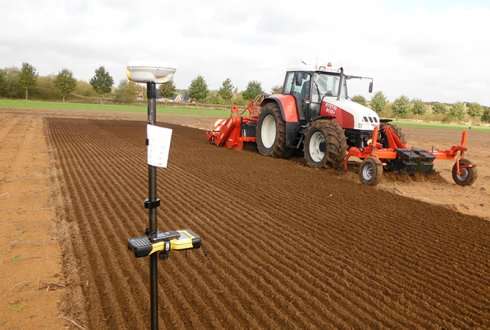Controlled 'reset' for nematode-infested soil

Harmful nematodes that damage the soil can be controlled by creating an environment in which they are temporarily deprived of oxygen. Covering the soil with plastic film or a layer of water encourages anaerobic bacteria to produce fatty acids, which will kill most nematodes. "It does sometimes take a while," says Leendert Molendijk, soil expert at Wageningen UR. Molendijk and his project partners are looking for ways to speed up the process. One of the methods being explored is a protein that can be added to the soil to 'feed' the bacteria. "This would mean farmers wouldn't have to wait so long to use their land again."
Anaerobic soil decontamination
The anaerobic soil decontamination principle was discovered by chance during the Second World War. Bulb growers whose land had been flooded throughout the summer after a dyke had been pierced, noticed a distinct lack of nematodes during the following season. "Unfortunately, it soon became clear that this method of inundation was not suitable everywhere," explains Molendijk. "The level of groundwater for asparagus farmers in Limburg, for example, is so low that they cannot flood their land for lengthy periods without having to pump up huge volumes of extra water, which contains oxygen."
According to Molendijk, farmers can cover their land with a layer of plastic film instead of water. "This is particularly effective if you also mix extra organic substances, such as grass, into the soil as this encourages the bacteria to produce volatile fatty acids. The downside is that this can be a lengthy process. Farmers using this method may not be able to use their land for two months and the results vary."
Pure protein
Last year, Wageningen UR carried out field tests using an alternative to grass as a source of organic food for the bacteria. The product Herbie® made by the company Thatchtec contains substances including plant-based proteins derived from residual waste from the agro industry. "The field tests show that soil that has been treated with this product and covered with plastic film is sometimes free from nematodes within two to three weeks," says Molendijk. "In addition, more nematodes were killed than in the field tests whereby we covered the soil but did not use the protein or another organic agent," he continues.
Non-chemical
"You could refer to this method of anaerobic soil decontamination as organic soil decontamination, because it does not involve synthetic chemicals such as methyl bromide or Monam. But I still prefer to call it 'anaerobic soil decontamination', because we do not use any fungi or biological antagonists of the soil nematodes."
The field tests show that this method does not render the soil sterile, as is the case with steaming. Molendijk: "This proves that certain beneficial soil organisms survive, and are able to restore the balance in the soil system once the film cover is removed."
Tricky plastic
Molendijk acknowledges that there are still a few problems he would like to resolve. "Covering soil with a layer of film is a time-consuming, tricky and relatively expensive business. And the longer you have to leave the plastic, the greater the risk of damage from weather, wind, birds or other animals. This allows oxygen into the soil, undoing the beneficial effect. We are now testing a covering based on starch."
Another important factor is the price of the product that could improve the decontamination process, claims the researcher. "A lily or asparagus farmer might be able to afford it at the moment, but your average potato farmer certainly can't."
Tip of the iceberg
Until recently, an agent known as Monam (now subject to a moratorium) was used in the Netherlands on 6,000 ha of land. The moratorium prompted the Ministry of Economic Affairs to speed up research into alternatives. "Of course these 6,000 ha were only the tip of the iceberg," says Molendijk. "A third of all our agricultural and horticulture land is actually infested with nematodes. This research could be a real breakthrough for a lot of farmers."
Provided by Wageningen University



















